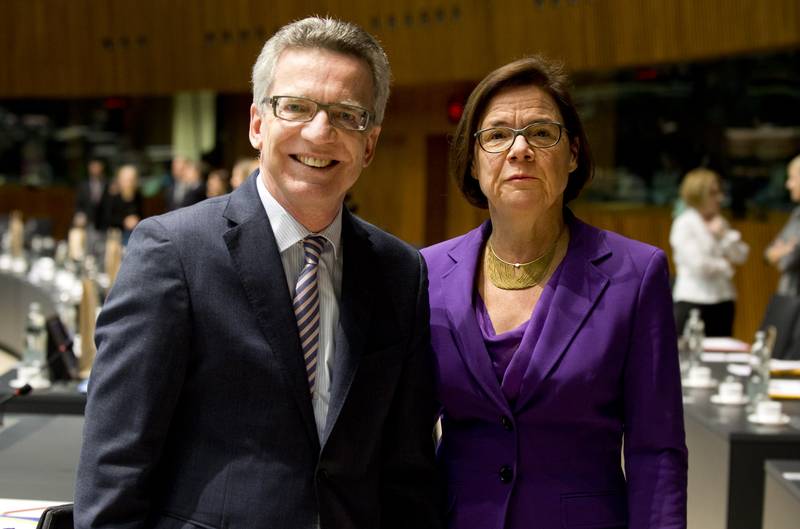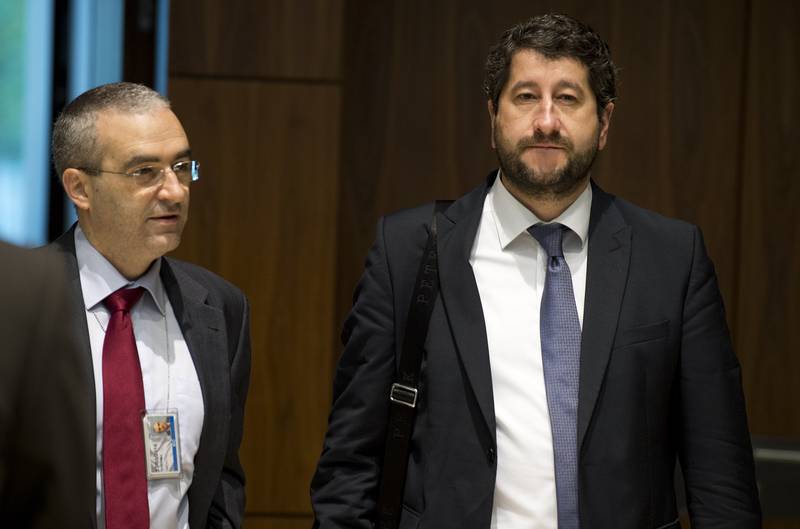How Personal Our Personal Data Can Be on the Internet?
Adelina Marini, October 30, 2014
 This question arose during the Justice and Home Affairs Council on 10 October. On the agenda of the EU justice ministers was a public discussion of the draft regulation of the European Commission aimed at updating the data protection legislation. An essential part of this draft regulation is the right to be forgotten. Lats spring, however, a court ruling provoked the almost philosophical question how personal are the personal data and to what extent the boundary of the personal is capable of harming the freedom of expression. On 13 May 2014, the European Court of Justice has ruled on the Mario Costeja González's case against the Internet search engine Google. In 2010, the Spaniard filed a complaint with the Spanish Data Protection Agency (AEPD) against the publisher of the La Vanguardia newspaper, which has a huge circulation in Spain, and against the Spanish branch of Google.
This question arose during the Justice and Home Affairs Council on 10 October. On the agenda of the EU justice ministers was a public discussion of the draft regulation of the European Commission aimed at updating the data protection legislation. An essential part of this draft regulation is the right to be forgotten. Lats spring, however, a court ruling provoked the almost philosophical question how personal are the personal data and to what extent the boundary of the personal is capable of harming the freedom of expression. On 13 May 2014, the European Court of Justice has ruled on the Mario Costeja González's case against the Internet search engine Google. In 2010, the Spaniard filed a complaint with the Spanish Data Protection Agency (AEPD) against the publisher of the La Vanguardia newspaper, which has a huge circulation in Spain, and against the Spanish branch of Google.
The reason is that during a search in the Google data base, a list of links was displayed to webpages of the newspaper from January and March 1998 containing an announcement for a real-estate auction organised following attachment proceedings for the recovery of social security debts owed by Mr Costeja González. The Spanish agency ruled that the newspaper cannot be held accountable for the display of these results because it has correctly published the information. The responsibility lies with Google Spain, the AEPD said. Google, however, is of the opinion that they cannot be held accountable for this and this is why the case ended up with the European Court of Justice which ruled that the data operators - in this case Google Spain - is responsible for the effect on the fundamental right of privacy and data protection and that is why they have to ensure that within their responsibility, powers and capabilities their activities are in line with the requirements of the data protection directive.
Therefore, the responsibility of the data operator includes, in certain circumstances, also the obligation to remove links to webpages published by third parties that contain information about an individual. When and under what circumstances the deletion of data should be allowed, especially when they could be significant in terms of the public interest and in this regard their deletion could be treated like censorship; to what extent a private company can be trusted that it is being able to decide objectively which data need to be deleted and which not, were part of the questions the justice ministers discussed two weeks ago. They did not come to a decision because the discussion was entirely political and the topic remained opened, but the opinion that a balance needs to be sought between the fundamental right for data protection and the freedom of expression prevailed and that every case should be viewed individually.
For the European Commission, the ruling of the European Court of Justice shows how urgently it is to adopt the reform of the data protection legislation. In January 2012, the Commission proposed a radical reform of the current European legislation, provoked by the fast changes in the digital world and the need EU to be in line with it, especially when it comes to huge companies which are non-European by origin. The reform was launched and completed by Viviane Reding, the former European Commission vice president who was responsible for the justice, fundamental rights and citizenship. Ms Reding's enthusiasm, however, did not find understanding in the Council where the negotiations are stuck. All this until the Snowden case, which revived the discussions on the issue but, again, failed to lead to a final approval of the draft. The Google Spain case also injected new energy into the debate on the reform of the data protection legislation.
According to Martine Reicherts, justice commissioner, the Court had to intervene because the EU rule for data protection is no longer applied on the Internet. This is an important evolution of the judicial practise, the Commission claims. The position of the EU's executive is that the draft regulation takes the protection of freedom of expression very seriously because the right to be forgotten contains also an explicit exception related to the freedom of expression. There is also a specific article about the right of expression and the right to be informed, the Commission's position states. Luxembourg, however, is of the opinion that the ECJ outpaces the decision of the co-legislators and sees a desire by the judges to generalise such a decision. The right to be forgotten touches upon the fundamental rights the way they are enshrined in the European Charter on Fundamental Rights, which, in Article 11, defends also the right of information. However, the Court does not mention this article of the Charter. Those are two-dimensional rights and a hierarchy should not be sought between the right to be forgotten and the right  of expression. "If we do that, we risk, although not deliberately, to come to censorship or to a primate of the personal life", was Luxembourg's position expressed by Mr Felix Braz, minister of justice.
of expression. "If we do that, we risk, although not deliberately, to come to censorship or to a primate of the personal life", was Luxembourg's position expressed by Mr Felix Braz, minister of justice.
He added that there should not be an individual solution of the cases but specific rights. He suggested another difficult task - to achieve a balance between the common European approach and the national traditions. French Justice Minister Christiane Taubira said that the right to be forgotten should not be an absolute one, rather it should be balanced with the freedom of media. She warned, however, that on the Internet, there are many young people and other individuals who are very vulnerable. Her proposal is the ministers to consider a procedure that would envisage an interference of a judge in order to maintain the fundamental liberties. According to her, it is important to provide ex-ante information about the requirements that can be put forward to the service providers or the data administrators and, possibly, to foresee a possibility to interfere in the work of these websites to protect the European citizens and to ensure the freedom of press and of expression.
Germany's Minister of the Interior Thomas de Maizière also pointed out that the two rights should be viewed equally and recommended to avoid excessive specification in the regulation. Germany has no specific position on the issue yet because it is still in the discussion phase. That is why he recommended to consider whether Article 11 of the Charter to be inserted in the main regulation on data protection. Roman Dmowski, however, Poland's minister of administration and digitalisation, said the main issue was whether the common regulation should be adapted to the content of the court ruling. It only gives an answer to a specific interpretation and does not contain a complete analysis to make an assessment in terms of data protection and freedom of expression. Poland doubts that the operators of search engines are the right people to make such an assessment because the practise shows that the decisions to stop the access to certain content are very controversial as to whether they are legal. Ending access on the basis of the right to be forgotten could infringe not only certain interests of individuals but the economic interests of third parties, like content providers for instance. In this particular case publishers.
Mr Dmowski added that to Poland, the ruling about Google Spain does not mean that the main regulation should be changed. "We're against enshrining obligations that are difficult to be realised". Similar was the position of Britain. Malta, though, urged for caution for make a distinction between private persons and the legal entities. A private individual should have the right to be forgotten and that right should have a priority over the rights of legal entities. Malta disagrees legal entities to have the right to be forgotten. And to The Netherlands it is important national courts to be the ones that rule in such cases. The Czech Republic said the Spanish court's ruling should be interpreted as a specific case only, not as a message to the legislators. Croatia's Minister of Justice Orsat Miljenic shared The Netherlands's view that the member states should be the ones to have sufficient freedom to regulate on national level.
According to Austria, many more discussions are needed before the times comes to regulate because this will affect also the problems of bloggers, Twitter-users and others. Romania recommended to wait for other precedents because the court ruling is related to only one type of operators - the search engines - whereas the regulation should cover the other data operators as well. The new minister of justice of Slovenia, Goran Klemencic, to whom this was the first Justice and Home Affairs Council after the formation of a new government in Slovenia, said that the power of the social media was huge. Those are the most powerful websites, so this is not only about the right of expression but also what will happen when the right to be forgotten is exercised over an article or a chapter of some important news magazine. It is too early to regulate the matter in the common regulation, he added.
Ireland is of the opinion that the deletion of links in a search engine does not necessarily mean deletion of data. The country is worried that the freedom of expression is in danger in the EU. The Bulgarian minister of justice in the caretaker government, Hristo Ivanov, did not take the floor during this discussion. Italy's Andrea Orlando, who chaired the Council, concluded the discussion, again, offering food for thought. During the political discussion about the rights on the Internet, the Nobel committee awarded the Nobel Peace Prize to Malala and Kailash Satyarthi, an Indian activist, for their fight against suppression of children's and young people's rights and also for the right of all children to education. This morning we spoke a lot about these rights and we have to mention how important it is that the EU  defends the rule of law and the fundamental rights not only on our continent but beyond our borders as well, said the minister and was strongly applauded by his colleagues.
defends the rule of law and the fundamental rights not only on our continent but beyond our borders as well, said the minister and was strongly applauded by his colleagues.
Data protection and its connection to the fundamental rights and liberties will continue to be on the EU's agenda and because of the new cases that emerge it is obvious that the adoption of the regulation will not happen soon. Bearing in mind the situation of the freedom of expression in Hungary, for instance, much more deeply should be discussed the question whether, indeed, these cases should be resolved at national level, according to national traditions or should a priority be given to the common European approach, especially taking into account the trans-border character of the Internet. In defence of the national approach spoke The Netherlands, Croatia, Hungary.